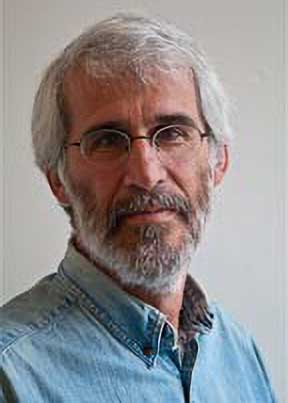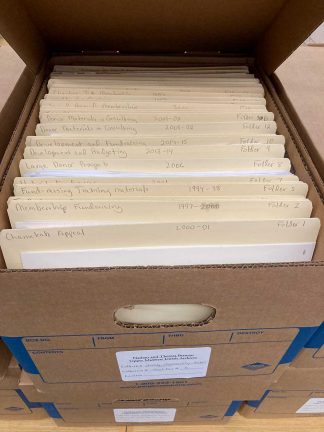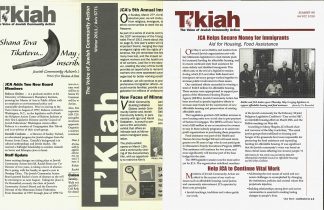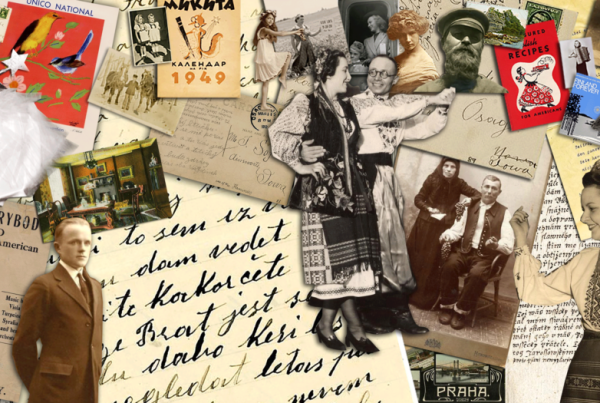By Allison Campbell-Jensen
Vic Rosenthal, Jewish Community Action’s executive director from 2000 to 2017 and, prior to that, a member of the board from its founding in 1995, wanted to write a book about the history of the organization and lessons learned. But he and his co-author, MCTC professor Michael Kuhne, realized they needed someone to organize the St. Paul-based organization’s papers first.
With encouragement from Katherine Tane, former director of the Jewish Historical Society of the Upper Midwest, and help from Kate Dietrick, Archivist of the Upper Midwest Jewish Archives (UMJA), Rosenthal successfully applied for three Legacy grants, allowing him to write the book manuscript and perform archival work with Dietrick by bringing the Jewish Community Action collection, including oral histories, into UMJA. Legacy grants are administered by the Minnesota Historical Society.
The result, Dietrick says, “was a super-unique experience.”
“It was fantastic for me, as we were going through things, to have the institutional memory literally sitting right next to me,” Dietrick says. “I think it was interesting for him to see the other side: Why we as archivists do what we do. As we are organizing materials, we are thinking about the researcher.”
The materials will provide insights into this still-active nonprofit that focuses on social, economic, and racial justice, through the lens of Jewish values. “One Jewish value we often speak of,” Dietrick says, “is tikkun olam, which is to repair the world.”
The work of Jewish Community Action
Tikkun olam encompasses a lot of activities. Connect to the collection finding aid and one will find links to topics from affordable housing, anti-poverty, and immigration issues to the marriage amendment, other GLBT-related actions, and challenging white supremacy. “For me, it was fascinating to find things from work I had done more than 20 years ago,” Rosenthal says.
Issues that particularly touched Rosenthal include immigration because his grandparents came to the United States from another country.
“I know the struggles that immigrants had back then and have now,” he says. “I think the efforts to make their lives easier coming into the United States and protect their rights really resonated with me.”
The work on anti-racism and white supremacy was valued by him because white supremacy has been linked to anti-Semitism. “White supremacy hurts people of color, it hurts immigrants, it hurts Jews, it hurts Muslims,” Rosenthal says.
Freedom seders are a favorite of Dietrick’s. They transform the traditional Passover ritual meal remembering slavery and liberation into opportunities to invite in Jewish Community Action partners to talk about modern stories of people fighting for liberation.
“In parts of the seder, when they talk about no longer being slaves,” she says, Jewish Community Action “brings a modern bent of ‘We have incarcerated people in this country, and we need to be mindful of them.’”
Rosenthal also remembers 2012 efforts to combat the marriage amendment and Voter ID.
“Those were both such lively and powerful campaigns, and among some of the most amazing efforts I have ever been part of, because we were expected to lose on both and we won on both. We won because we had thousands of volunteers coalescing from lots of organizations to work together and those kinds of opportunities don’t come up that often.”
Grant-funded partner
“[T]he work of Jewish Community Action will be cataloged and available to anyone who comes along and wants to know. This process of oral histories … made this work even more real.”
—Vic Rosenthal
“That’s great that they are willing to volunteer,” she says, “but these people have a unique skill set and unique knowledge that enhances this work — and it is work and they should be paid.”
Rosenthal felt a difference, too. “It’s made the work feel more legitimate and more important, that it’s not just being done as a volunteer, but rather as a paid consultant,” he says.
After the grant funding came through in late 2019, they had just a couple of months to process records before the campus shut down for COVID; Dietrick went back in summer 2020 but Rosenthal could not. Finally, in summer 2021, they both were able to come inside, and had an intense time together going through boxes Rosenthal brought from Jewish Community Action to meet an extended deadline.
“Kate is a very, very good supervisor,” Rosenthal says. “She taught me all about how to go through boxes and how to put them in new folders, we had to label them and then we built a new inventory. All of that was a new experience for me. It was both very easy to do, following Kate’s instructions, and fun to learn about a whole new set of things that I didn’t know anything about.”
Dietrick enjoyed being able to ask Rosenthal directly about materials, not relying on outlines of history to construct the collection or learn about the organization as she worked. “Inevitably,” she says, “there are questions that arise, because no one keeps their papers in perfect order with everything perfectly labeled and described.”
Another benefit of the partnership was allowing Rosenthal and Jewish Community Action to build trust in Dietrick and the role of the Upper Midwest Jewish Archives, she says.
“Especially when you are working with marginalized communities, building trust that we are not erasing or censoring histories, in particular, contested or tricky histories,” Dietrick says. “We as archivists are not doing that but to have someone, a lay person, so to speak, or a researcher or a content creator with us at the time seeing that work is just another way of building trust and relationship with the community.”
Dietrick also gets enjoyment from working with a present-day organization, from the 1990s and 2000s. “It was really great to be able with work with Vic and have the person who was there, with me the whole time,” she says. “I’ve never had that experience.”
Now in the thick of writing the book, not yet titled, with his co-author, Rosenthal is excited about the UMJA collection he was instrumental in building.
“[T]he work of Jewish Community Action will be cataloged and available to anyone who comes along and wants to know. This process of oral histories … made this work even more real.”
The oral histories will be added to the collection and all of these materials, processed by an expert archivist and an expert in the organization, will be real for anyone in the future who wishes to research Jewish Community Action.






